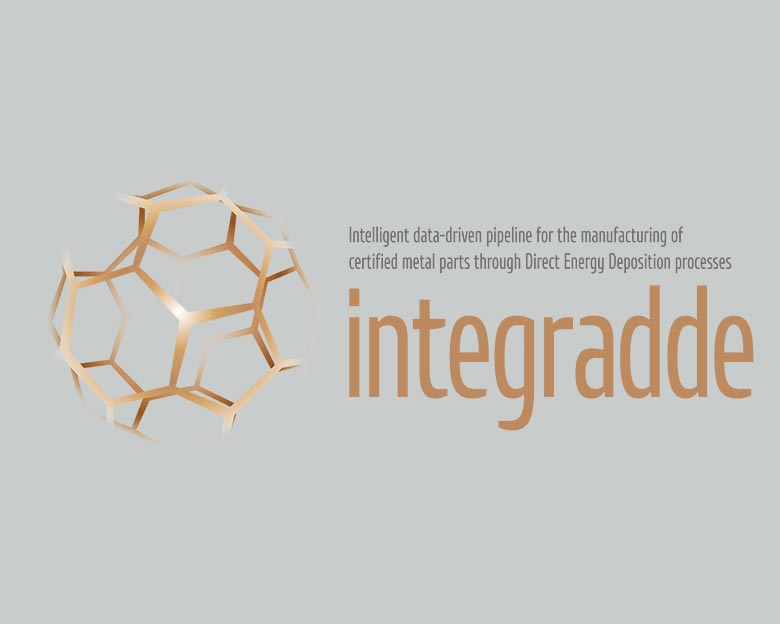DGH is member of a European flagship project that seeks to revolutionize the incorporation of 3D printing of metal components to the industry
- INTEGRADDE received funding from the European Union’s Horizon 2020 research and innovation program under grant agreement No 820776.
- INTEGRADDE is involving 26 partners from 11 countries and with a budget close to 17 million euros.
- INTEGRADDE seeks the real application of additive manufacturing (3D printing) in the European industrial environment. For this, it will develop a strategy of continuous and integral control of the processes of additive manufacturing, from product design to final verification.
Valladolid, April 15th, 2019.- DGH participates in INTEGRADDE along with other 25 partners from 11 countries and with a budget close to 17 million euros. This initiative pursues one of the fundamental objectives of the European Commission, to advance in Industry 4.0 by deploying the technology of additive manufacturing (3D printing) in the European industrial environment under real manufacturing conditions.
Manufacturing costs and the appearance of unpredictable defects in products and metal parts produced by additive manufacturing are preventing its adoption and deployment by the manufacturing industry of metal components. In short, a real implementation of 3D printing in the industry has not been achieved yet. Taking the leap to incorporate this technology in the industry, is the fundamental objective that INTEGRADDE project intends to achieve, through the development and implementation of a global control system that allows connecting the entire manufacturing process, from design to the manufacture of the pieces in a standardized form, allowing to implement a new manufacturing model, faster and with zero defects.
The project will focus on the production of metal parts of medium / large size, using 3D printing and aimed mainly at the aeronautical, metal-mechanical, automotive and civil construction sectors. In the first case, it will also bring a significant improvement of the processes currently used, since in the production of some parts, which are made by machining techniques, 90% of the necessary material can be wasted, and by additive manufacturing the raw material residue will be practically zero.
Project Innovations
To achieve INTEGRADDE objectives, the members of the consortium will develop a strategy of continuous and integral control of the additive manufacturing processes, from the product design stage to its final verification. In addition, they will analyze new design and process planning technologies, to help ensure that there are no manufacturing defects; they will look for solutions that can be adapted to existing industrial equipment will also look for new manufacturing cells; and will seek to combine different technologies (welding, machining, etc.) to achieve hybrid manufacturing processes. Likewise, they will apply data analytics and artificial intelligence, to support the design and manufacturing processes, both for existing pieces and new components; and they will advise on the creation of new procedures for standardization and certification of manufactured parts.
With all this, it is estimated that the reliability of additive manufacturing processes will increase by 40% and the production speed will increase by 25%. In addition, it will be possible to address the manufacture of new parts with greater demands and simplify the current processes, in addition to improving their quality.
Applications in the end user
The advances obtained in this project will be tested by the end user. Some examples of companies that will apply the developments of the INTEGRADDE initiative will be:
- GKN Aeroespace, to produce components of commercial aircraft engines;
- ArcelorMittal, in the manufacture of large parts for the steel manufacturing process;
- MX3D (company that has created the first metal bridge manufactured by additive manufacturing) for civil construction solutions;
- Firms such as Loiretech or Corda, to manufacture molds and tools for the production of parts for the aeronautical and automotive sectors, respectively.
In addition, the members of the consortium will create a network to support companies that are evaluating the possibility of incorporating additive manufacturing technology in their industrial processes, with the aim that they can evaluate the possibilities of 3D printing of metallic components, before carrying out the investment that the adoption of these technologies implies in real manufacturing conditions.
INTEGRADDE Consortium
INTEGRADDE has a budget of around 17 million euros, and is co-financed by the European Commission, through the H2020 program. The consortium, led by AIMEN, is made up of 26 partners from 11 countries: Germany, France, Slovenia, Spain, Greece, Italy, United Kingdom, Sweden, the Netherlands, Poland and Portugal.
The entities that comprise the consortium are: AIMEN Technological Center(Spain), LimitState(United Kingdom), University of Sheffield (United Kingdom), ESI Software Germany GmbH (Germany), ATOS(Spain), Commission of Alternative Energies and Atomic Energy of France – CEA (France), Institut de Recherche Technologique Jules Verne (France), MX3D (Netherlands), Loiretech (France), Fundingbox Accelerator (Poland), Imperial College of Science, Technology and Medicine – University of London (United Kingdom), Bureau Veritas (France), line-height: IREPA Laser (France), Högskolan Väst (Sweden), New Infrared Technologies – NIT (Spain), GKN Aerospace (Sweden), Deutsches Institut für Normung – DIN (Germany), Acelormittal Innovation, Research and Investment (Spain), University of Coimbra (Portugal), Datapixel (Spain), Corda (Slovenia), DGH Robótics (Spain), Laboratory for Manufacturing Systems & Automation – LMS (Greece), Brunel University London (United Kingdom), Prima Industrie (Italy) and ESI Group (Germany)
